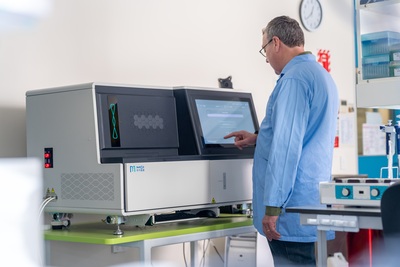Sequencing tech could transform NZ viticulture

Life science company MGI Tech Co has partnered with Lincoln University in Canterbury, New Zealand, to address sustainable challenges in viticulture through advanced sequencing technology. The initiative aims to utilise genomics to breed better varieties of grapevines and hops that are tolerant and resistant to pests and diseases, thus reducing fungicide use across New Zealand’s NZ$2.1 billion wine export industry.
Viticulture is a significant economic source of revenue for New Zealand, ranking as the nation’s sixth-largest export earner. But the country’s vineyards are particularly vulnerable to fungal diseases, often requiring frequent and broad-spectrum spraying to maintain vine health and grape quality. As a result, New Zealand farmers apply approximately 3400 tonnes of pesticides every year — despite the fact that, under US Environmental Protection Agency classification, 60% of fungicides and 72% of plant growth regulators used locally are considered potential carcinogens. This has placed the sector in the crosshairs of consumer and environmental scrutiny, particularly as climate change drives more volatile weather conditions that heighten disease risk and see traditional spraying schedules prove less effective.
To address these challenges, New Zealand scientists have started a genomic study to reduce the wine sector’s reliance on chemical sprays. By using advanced sequencing technology, researchers can now rapidly scan thousands of grapevine samples to identify those with natural resistance to disease and environmental stress. This approach not only opens a pathway to breed more resilient grape varieties, it also enables real-time monitoring of vineyard conditions, laying the foundation for more targeted, sustainable and cost-effective vineyard management.
The genomics practices allow scientists to map the natural genetic diversity within thousands of grapevines, identifying those with inherent disease resistance. Early findings suggest that, with targeted intervention informed by this data, chemical spray use could be reduced by up to 80% in some vineyards — resulting in lower costs, less residue in the wine, and reduced pressure on soil health and the environment.
Associate Professor Christopher Winefield from Lincoln University’s Department of Wine, Food and Molecular Biosciences, who first introduced genomics into his research to explore traits like fungal tolerance and soil health response, is now scaling the project significantly through the use of the MGI DNBSEQ-G400 genome sequencer — a next-generation sequencing platform designed to enable unprecedented scale and speed in genomics with economic cost. Traditionally, testing a few hundred grapevine samples per year was considered standard; now, the lab can process over 50,000 annually — a 100-fold increase in volume.
“The introduction of MGI sequencing tools has really helped democratise sequencing for small teams like myself,” Winefield said. “The cost of that sequencing is highly competitive. We’re now looking to process up to 50,000 samples a year — we simply couldn’t do that without MGI’s support.”

The genomic data is helping scientists identify vines that are more resilient under water stress or nutrient limitations — a key consideration as climate volatility increases. Additionally, the platform can support real-time sequencing to detect pathogens like powdery mildew and mealybug; this enables precision agriculture approaches, where interventions are localised rather than applied uniformly.
“Instead of scheduled spraying, farmers can move to evidence-based treatment,” Winefield said. “It’s a shift from blanket coverage to pinpoint accuracy. That means fewer chemicals in the environment and better resistance management.”
Winefield and his colleagues are now looking to form a standalone venture to bring affordable genomic testing to the country’s broader agriculture sector; the startup will serve viticulture, horticulture and dairy farms, giving producers access to real-time insights previously confined to high-cost labs. This data-driven model would enable even small-scale producers to detect early signs of disease, make proactive crop management decisions and cut down on unnecessary chemical inputs.
“This is about getting world-class science into farmers’ hands,” Winefield said. “Our goal is to process a million samples annually at launch and grow to 10 million within five years.”
Furthermore, with international viticulture facing similar challenges, the research could become a blueprint for sustainable production globally. Indeed, Winefield envisions a future where genomic diagnostics is as routine in farming as soil testing or weather tracking.
“This isn’t just about grapevines,” he said. “Whether it’s hops, kiwifruit, apples or livestock, we can use this data to reduce disease pressure, improve yields and make smarter input decisions.”
“This is a powerful example of how cutting-edge technology supports the future of agriculture,” concluded Dr Bicheng Yang, Director of MGI Australia. “By helping researchers uncover the genetic drivers of disease resistance, we’re enabling the industry to move away from chemical dependency and toward natural plant resilience.”
Phone: 07 3362 0475
Dharmacon ON-TARGETplus siRNA for precision gene knockdown
Dharmacon ON-TARGETplus siRNAs by Revvity combine a patented dual-strand modification pattern...
AdipoGen Life Sciences InVivoKines recombinant fusion proteins
InVivoKines are recombinant fusion proteins for immunotherapeutic, preclinical and translational...
PhenoSys qOMR system for objective vision assessment in mice
PhenoSys introduces the qOMR (quantitative Optomotor Response) system, a fully automated platform...



